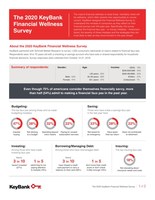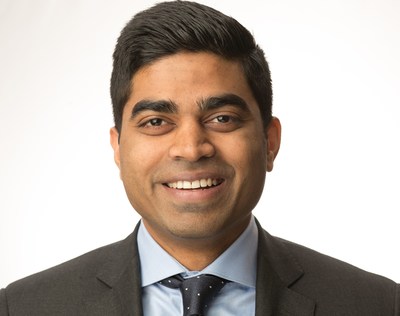New Study Shows Almost No One is Immune to Financial "Faux Pas"
1 in 4 Americans admit to impulse buying they later regret, KeyBank Behavioral Economist says
CLEVELAND, Jan. 6, 2020 /PRNewswire/ -- According to the new Financial Wellness Survey from KeyBank, 75% of consumers consider themselves financially savvy, with 41% stating they're savvier than most or consider themselves an expert when it comes to personal finance. Despite this, more than half (54%) admit they have made a financial "faux pas"—referring to a money "false step" or error—and impulse buying tops the list as the most common "faux pas" among all consumers (25%).
Financial "Faux Pas" Infographic: https://bit.ly/2SZCFBx
Financial "Faux Pas" Fact Sheet: https://bit.ly/39L2StO
"The path to financial wellness is rarely linear. Inevitably, there will be setbacks, which often present new opportunities to course correct. The important thing to remember is there are small steps you can take today—like checking your account balance—that will propel you forward to create a healthy, sustainable and resilient financial future," said Chenna Cotla, Behavioral Economist in KeyBank's Financial Wellness strategy group.
The findings revealed financial "faux pas" related to budgeting are the most common type of money misstep, followed by savings, debt management, investing, and insuring. For example, nearly half (47%) of consumers who committed a budgetary "faux pas" reported they had fallen victim to sudden spending whims more often than other types of budgeting "faux pas," such as spending beyond their means or paying for subscription services that go unused.
Additionally, among those who made savings "faux pas":
- 1 in 3 respondents didn't save for an emergency.
- More than 1 in 4 admit to spending their tax return.
- More than 1 in 5 admit to not contributing to retirement savings.
"The truth is not all 'faux pas' are created equal," continued Cotla. "Some false steps with finances may be common, but that doesn't mean they aren't serious. In fact, 1 in 3 consider not saving enough/waiting too long to save for retirement to be the most severe of financial 'faux pas.' If not addressed promptly, such missteps can be a slippery slope."
Financial Confidence Does Not Equal Immunity to Budgeting Missteps
Interestingly, despite feeling more confident in their financial know-how, younger generations more often have budgeting issues compared to older generations. For example, 1 in 5 Millennials consider themselves a financial expert, compared to fewer than 1 in 10 Baby Boomers. Additionally, 1 in 3 Millennials who committed budgeting "faux pas" reported feeling afraid to check their bank account, compared to 1 in 5 Gen-Xers and just 1 in 10 Baby Boomers.
Bouncing Back from Financial "Faux Pas" May Take Less Time Than You Think
The good news is a large majority of respondents who committed a financial "faux pas" (89%) feel they can recover within five years. In fact, most people (59%) prefer to face their financial "faux pas" head on. Those who have made a financial misstep will either turn to their spouse/significant other or a family member for support (48%), investigate online resources (26%) or seek counsel from a banker/financial advisor (22%). However, 22% don't talk to anyone because they're either too embarrassed or aren't sure who to talk to.
"Don't overlook the resources at your disposal, especially when you have the option to build a financial team with your banking partner. With the help of Key's Financial Wellness Consultants and digital tools, for example, you can protect yourself from financial 'faux pas' in the year ahead," said Patrick Smith, KeyBank's head of Financial Wellness & Retail Strategy.
In fact, 65% say they are most likely to take these three steps to prevent money mistakes in 2020:
- Identify and prioritize "needs" vs. "wants" (30%)
- Determine a monthly budget and revisit on a weekly basis (22%)
- Educate themselves through financial literacy courses (13%)
Continued Smith, "We're here to help you move forward on your financial wellness journey, wherever you are along the way. We encourage everyone to set up an appointment with their local KeyBank branch to complete a Financial Wellness Review and partner with their banker to make informed, confident financial decisions. January is Financial Wellness Month across the country–the perfect time to take charge of your financial situation and avoid potential financial faux pas this year."
For additional information, articles and tips on getting your financial life in shape, visit www.key.com/resolutions
About KeyBank's 2020 Financial Wellness Survey
KeyBank partnered with Schmidt Market Research to survey 1,200 consumers nationwide on topics related to financial faux pas. Respondents were 18 to 70 years old with a checking or savings account who have sole or shared responsibility for household financial decisions. Survey responses were collected from October 14 -21, 2019.
About KeyCorp
KeyCorp's (NYSE: KEY) roots trace back 190 years to Albany, New York. Headquartered in Cleveland, Ohio, Key is one of the nation's largest bank-based financial services companies, with assets of approximately $146.7 billion at September 30, 2019. Key provides deposit, lending, cash management, and investment services to individuals and businesses in 15 states under the name KeyBank National Association through a network of over 1,100 branches and more than 1,400 ATMs. Key also provides a broad range of sophisticated corporate and investment banking products, such as merger and acquisition advice, public and private debt and equity, syndications and derivatives to middle market companies in selected industries throughout the United States under the KeyBanc Capital Markets trade name. For more information, visit https://www.key.com/. KeyBank is Member FDIC.© 2019. KeyCorp. CFMA #191216-710657
![]() View original content to download multimedia:http://www.prnewswire.com/news-releases/new-study-shows-almost-no-one-is-immune-to-financial-faux-pas-300981575.html
View original content to download multimedia:http://www.prnewswire.com/news-releases/new-study-shows-almost-no-one-is-immune-to-financial-faux-pas-300981575.html
SOURCE KeyCorp





